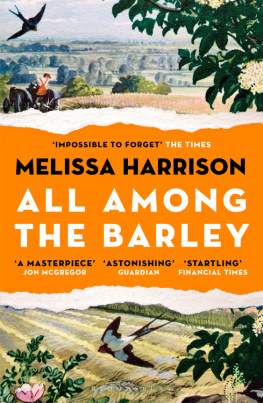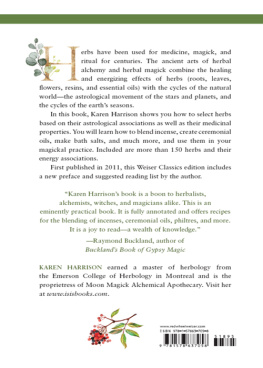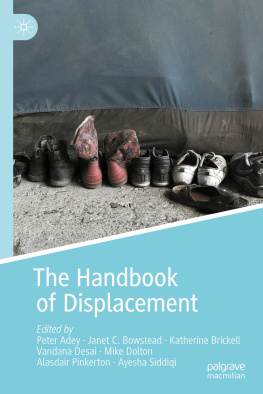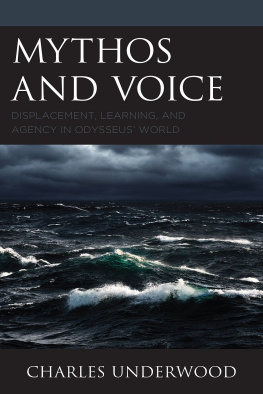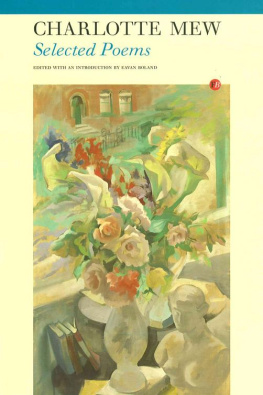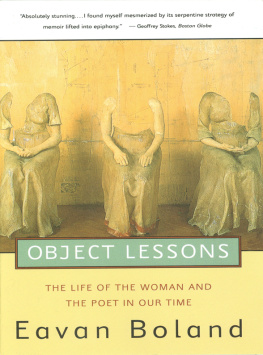Foreword by
EAVAN BOLAND
A Mariner Original / Mariner Books
HOUGHTON MIFFLIN HARCOURT
Boston New York 2009
Copyright 2009 by Leslie Harrison
Foreword copyright 2009 by Eavan Boland
All rights reserved
For information about permission to reproduce selections
from this book, write to Permissions, Houghton Mifflin
Harcourt Publishing Company, 215 Park Avenue South,
New York, New York 10003.
www.hmhbooks.com
Library of Congress Cataloging-in-Publication Data
Harrison, Leslie, date
Displacement / Leslie Harrison.
p. cm.
"A Mariner Original."
ISBN 978-0-547-19842-2
1. Displacement (Psychology)Poetry. 2. Loss
(Psychology)Poetry. I. Title.
PS3608.A78357D57 2009
811'.6dc22 2008053288
Book design by Melissa Lotfy
Printed in the United States of America
DOC 10 9 8 7 6 5 4 3 2 1
For my familiesthe one I was born into, the ones I've made
And for my mother, Eleanor Railsback (19342008)
and my grandmother, Marion Cook (19132009)
Contents
Foreword
The Four Elements
I: Pasipha
Firefly
Fifty States: A Travelogue (I)
Homeas hiking
I Dream of Rain
Solstice
How It Started
The Spider
I think my problem is
Fifty States: A Travelogue (II)
Autobiographyas a vase
II: Daedalus
Lunar Eclipse, Baltimore
Fifty States: A Travelogue (III)
Huntley Meadows, May
Fable
Farming the Moon
Correspondence
Fire
A Thousand Miles
Fragmentson hiking
The Old Schoolhouse
Dusting
Fifty States: A Travelogue (IV)
Hoarfrost
III: The Minotaur
The Day Beauty Divorced Meaning
Past Tense
Fifty States: A Travelogue (V)
Inventory
The Maps
Loveas memory
Binary
Winter
Maps
Fifty States: A Travelogue (VI)
How I Became a Ghost
Book Report
IV: Icarus
Self-Portrait as an Eastern Hardwood Forest
Instructions to the Realtor
Fifty States: A Travelogue (VII)
Loveas senility
Fifty States: A Travelogue (VIII)
For my house, a song of gratitude
Musicas infection
Tea
Pantoum for a Walk in the Woods
House Cool from the Night
Lately I Have Been Dark and at Peace
Notes
Acknowledgments
Foreword
Leslie Harrison's book has the evocative title Displacement. But not far into these poems, the reader finds the strength of the theme lies in its unsettling lack of definition. What exactly is being displaced? The body? The mind? The landscape?
In many of the lyric poems here the answer seems to be all of them: that unless one of them has poise, none of them will. The one element that is not displacedthat plants its step and holds its groundis poetic voice. It rings out, modulates, goes high and low and convinces from start to finish. It is capable of rhetoric, of down-to-earth vernacular; it has a gift for soliloquy and a weakness for monologue, as every human voice does. And listening to it is much like listening to a powerful, self-directed conversation. Much of the charm and music of this book for meand I believe for other readersmust have to do with this unabashed contradiction between a voice that has found its place in the poem, and a life that will not find an equivalent ease in the world.
The clearest example of this is also one of the most inviting poems in the book"The Day Beauty Divorced Meaning." I will quote it whole, since it is a poem of unusual wholeness, and also of visible, engaging contradictions: It has a sonnet mood, but is not a sonnet. It has a tone of irony, but is not ironic. It is, like so much of the fine writing here, a coalition of opposites: a lament for a life's occasion articulated through a zest for language.
Their friends looked shockedsaid not
possible, said how sad. The trees carried on
with their treeish livesstately except when
they shed their silly dandruff of birds. And
the ocean did what oceans mostly do
suspended almost everything, dropped one
small ship, or two. The day beauty divorced
meaning, someone picked a flower,
a fight, a flight. Someone got on a boat.
A closet lost its suitcases. Someone
was snowed in, someone else on. The sun
went down and all it was, was night.
I often think not enough is made of the way tone guides, waylays, and finally decides on the destination of the poem it appears to serve. It is a dominant Ariel, questioning and resisting and confusing the otherwise clear path. This is as true of a poem like "Tea," which meditates on the small ritual of drinking it to the mythic sequence that opens the books where Pasipha, Daedalus, and the Minotaur pro-vide costumes for dark themes of erotic loyalty and betrayal. This is a book with a real understanding of toneits reliable scale, its durable music.
I could list a number of other poems that caught my eye. There is, for instance, "Pantoum for a Walk in the Woods" and the playful, deceptive poem called "Past Tense," which uses all the registers of tone, language, and fractured syntax to lure the reader into the laby-rinth. The following lines open the poem:
Was firedon fire, not absent from pay
Was burning, was being fire over water
Was ashes, ashes. Was all fall down.
Was dusted was lusted. Was lusted after
Was flower'd. Not de-too late for that
Was leafed and green was left
Was left afterlongthe altar
Was altered, leaning far out of true
Was pitched was pitched wrong, and also out.
But excerpts, and even entire examples, are never the same as the book itself. There is a poise and presence about this bookand a poignance about its traffic between secrecy and disclosurethat allow it to have unusual force, and a true grip on its reader. This is a real lyric journey; and the reader will take it too.
EAVAN BOLAND
The Four Elements
I. Pasipha
Wife: word and vow. Invisible. Bound
as heat is to flame. No god did this,
no pretty, facile cow. A kingdom
of men, blinded. And meburning
to be seen. Burning for him. I chose,
did not haggle over price. At last,
in the ashes, after, you see me.
I made sure his whores spewed only
monsters. And I am one of them.
II. Daedalus
Falling, all my life. Not clever enough
not to come between a king, his wife.
No map for how to live past this.
I dismantled sleep, built wings, became
the air, took what I lovedrescued him.
But not to keep.
III. The Minotaur
I was a monster. I knew. At home
in the stone prison, innocent, amazed,
I simply was. But then they came
fair and afraid. I looked, held them in
my gaze, saw it in their eyes: the other.
A monster. Me. Devoured what they had taught:
beauty. Became its absence. Lay down
in welcoming mud, offered up
my misborn head. Took the blows. Was glad.
IV. Icarus
Pick up that shell. Hold it to your ear.
It is not the sea that sings inside,
not beating waves you hear. It is me
rinsed of ash, earth, and air; no architect,
ant, or string as guidelost. And drowning.
I carried them all, tried to set them free.
Burned her away in the sun, wore cloud,
escaped the walls, was lovely for them,
but fell for me.
I. PASIPHA
Firefly
The bats at dusk: their wild aerial twitch
and slide and all the while the moon
is undergroundnot quite silvering
the edges yetand you at the door.
My attention is given too often
to the sky, you say. I pretend
I can't hear through the screen
a thin net that holds
not even the light inside.
I nearly drowned once, or that's
Next page



